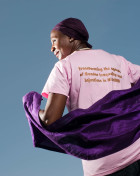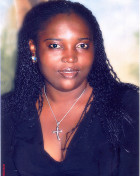I live in Algeria. I am the Director of an organisation that supports abandoned children and deprived women. I am also the Chair of an organisation promotes the rights of women and children and provide psychological support to mothers. I am currently the Vice President of ECOSOCC/AU (Economic and Social Cultural Council of the African Union)
I boldly call myself a feminist because since being a student I have always been committed to defend women’s rights. This has influenced and shaped my professional choices and well as my community work.
Despite strides in education and extensive work to promote the status of women, African women continue to be subjected to social injustice and patriarchal systems that continue to inhibit women’s dignity, rights and development.
The main challenge for activists is to ensure the implementation of the various conventions and instruments ratified by governments.
To effectively push back against efforts targeted at hampering women’s advancement, it is necessary for feminists to create and nurture vibrant regional networks. However, we need to think more creatively about how to ensure that these networks function well and assist in propelling us forward towards or ultimate goals. We also need to organise ourselves in such a way that on the one level we continue to ensure that we advocate for new legislation where necessary, or implementation and honouring of existing legislative instruments that promote our objectives and goals. Finally, we need to develop new ways of thinking around how we at community and societal level effectively curb gender-based violence and discrimination.
To achieve this, we have many resources at our disposal. We have the experiences of feminists across the continent who have seen many changes, we have tool kits and guides, and we even have our own funding initiatives. A specific toolkit that is invaluable in enabling our work is the African Feminist Charter in Africa. It is our responsibility to use it, disseminate it, adapt it and even make revisions as we start implementing with renewed vigour and revitalise our efforts for women’s rights.
On a personal level, I have managed to assert my feminist identity in my family as well as community. Moreover I have managed to bring up my two children, a girl and a boy and inculcate principles of equality in them. In the 70s I took a bold step by creating a safe space to provide support for single mothers that were ostracised by their communities.
I am deeply inspired by equality and what it represents. It does not have to remain and ideal – but can be a lived reality. I also completely ascribe to freedom and choices. As a feminist movement our goal is not to have all women be the same. Our fight has been to ensure that women have the freedom to choose how they wish to live out their lives and to be respected for whatever choices they make.




